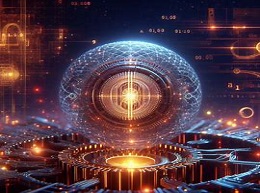Understanding Quantum AI: Harnessing Quantum Computing for Advanced Algorithms

Understanding Quantum AI: Harnessing Quantum Computing for Advanced Algorithms
In the rapidly evolving landscape of technology, the convergence of quantum computing and artificial intelligence (AI) stands out as one of the most promising frontiers. Quantum AI, the marriage of quantum computing principles with AI algorithms, holds the potential to revolutionize computation and problem-solving across various domains. In this article, we delve into the fascinating realm of Quantum AI, exploring its principles, applications, and the transformative impact it promises to bring.
Quantum AI: Quantum AI represents the synergy between quantum computing, which leverages the principles of quantum mechanics, and artificial intelligence, which encompasses algorithms and models that mimic human intelligence. Quantum computers, unlike classical computers, utilize quantum bits or qubits, which can exist in multiple states simultaneously, enabling them to perform complex calculations exponentially faster than their classical counterparts. By harnessing the unique properties of quantum mechanics, Quantum AI seeks to develop advanced algorithms capable of solving problems beyond the reach of classical computers.
Principles of Quantum Computing: At the heart of Quantum AI lies the principles of quantum computing, which depart from the binary logic of classical computing. Quantum computers leverage phenomena such as superposition and entanglement to perform calculations. Superposition allows qubits to exist in multiple states simultaneously, exponentially increasing computational power. Entanglement links the states of multiple qubits, enabling them to influence each other instantaneously, facilitating parallel processing and enhanced problem-solving capabilities.
Applications of Quantum AI: Quantum AI holds the potential to revolutionize numerous fields, including cryptography, drug discovery, optimization problems, and machine learning. In cryptography, Quantum AI algorithms could break conventional encryption methods while also providing secure quantum communication protocols. In drug discovery, Quantum AI can accelerate molecular simulations and protein folding predictions, leading to the development of more effective drugs and therapies. In optimization problems, Quantum AI algorithms can efficiently solve complex logistical challenges, such as route optimization and supply chain management. In machine learning, Quantum AI promises to enhance pattern recognition, optimization, and data analysis tasks, enabling the development of more powerful AI models.
Challenges and Limitations: Despite its tremendous potential, Quantum AI faces several challenges and limitations that must be addressed. Quantum computers are currently in the early stages of development, with limited qubit coherence and error rates. Scaling up quantum systems while maintaining qubit stability remains a significant challenge. Additionally, developing quantum algorithms that can outperform classical algorithms on a wide range of tasks requires innovative approaches and rigorous testing. Moreover, Quantum AI applications may also raise ethical and security concerns, such as the potential impact on privacy and the need for robust encryption protocols in a quantum-powered world.
Future Outlook: As research and development in quantum computing and AI continue to advance, the future of Quantum AI appears promising. With ongoing efforts to improve qubit coherence, error correction techniques, and algorithmic innovations, Quantum AI is poised to unlock unprecedented computational power and algorithmic capabilities. Collaborations between academia, industry, and government agencies are driving progress in this field, paving the way for transformative breakthroughs in science, technology, and society.
Quantum AI represents a paradigm shift in computing, offering the potential to tackle some of the most complex challenges facing humanity. By harnessing the principles of quantum mechanics and artificial intelligence, Quantum AI promises to revolutionize computation, unlocking new frontiers in science, medicine, finance, and beyond. As researchers continue to push the boundaries of Quantum AI, we stand on the brink of a new era of discovery and innovation, where the impossible becomes possible through the power of quantum technology.